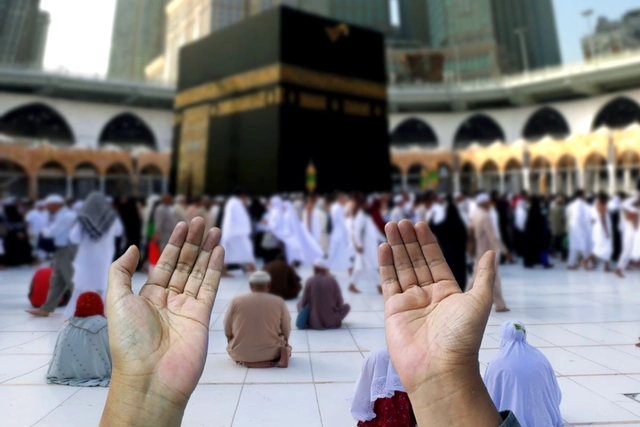Umrah holds a significant place in the hearts of Muslims around the world. It is a pilgrimage to the holy cities of Mecca and Medina, and while it is not mandatory like the Hajj, it is highly recommended in Islam. Umrah is a spiritual journey that allows Muslims to seek forgiveness, blessings, and mercy from Allah. It is a time for self-reflection, repentance, and spiritual rejuvenation. The significance of Umrah lies in the opportunity it provides for Muslims to draw closer to Allah, seek forgiveness for their sins, and purify their hearts and souls. It is a time for Muslims to detach themselves from the distractions of the world and focus on their relationship with Allah. The act of performing Umrah is a demonstration of faith, devotion, and submission to the will of Allah. It is a time for Muslims to express their gratitude for the countless blessings they have received and seek guidance for the challenges they face in their lives.
Umrah is also a time for Muslims to connect with their fellow believers from around the world. It is a time for unity, brotherhood, and sisterhood as Muslims come together to perform the rituals of Umrah. The significance of this pilgrimage extends beyond the individual’s spiritual journey; it is a collective experience that strengthens the bonds of the Muslim community. Umrah serves as a reminder of the unity and equality of all Muslims, regardless of their race, nationality, or social status. It is a time for Muslims to come together in worship, supplication, and remembrance of Allah. The significance of Umrah lies in its ability to bring Muslims closer to their faith, their community, and their Creator.
Preparing for your journey to Mecca and Medina
Preparing for the journey to Umrah requires careful planning and consideration. It is essential to make all necessary arrangements well in advance to ensure a smooth and fulfilling experience. One of the first steps in preparing for Umrah is to obtain a visa for entry into Saudi Arabia. This process typically involves submitting an application through an authorized travel agency and providing the required documentation, such as a valid passport and proof of vaccination. It is important to familiarize oneself with the specific requirements and regulations for obtaining an Umrah visa to avoid any delays or complications.
In addition to obtaining a visa, it is crucial to make travel arrangements, including booking flights and accommodations in Mecca and Medina. Many travel agencies offer Umrah packages that include transportation, lodging, and guided tours, which can simplify the planning process for pilgrims. It is advisable to research different packages and compare prices to find the best option that suits one’s needs and budget. Furthermore, it is essential to pack appropriate clothing and essentials for the journey, taking into account the climate and cultural norms of Saudi Arabia. Pilgrims should also familiarize themselves with the rituals and practices of Umrah to ensure they are adequately prepared for the spiritual journey ahead.
Performing the Tawaf and Sa’i rituals
The Tawaf and Sa’i rituals are integral components of the Umrah pilgrimage, symbolizing acts of devotion, obedience, and perseverance. Tawaf refers to the act of circumambulating the Kaaba, the sacred structure located in the center of the Masjid al-Haram in Mecca. This ritual involves walking around the Kaaba seven times in a counterclockwise direction while reciting prayers and supplications. The Tawaf signifies the unity of Muslims in their worship of Allah and serves as a physical manifestation of their spiritual connection to the divine. It is a time for pilgrims to express their love, reverence, and submission to Allah as they circle the Kaaba in unison with fellow believers.
Following the Tawaf, pilgrims proceed to perform the Sa’i ritual, which involves walking back and forth between the hills of Safa and Marwah seven times. This ritual commemorates the actions of Hagar, the wife of Prophet Ibrahim, as she searched for water for her son Isma’il in the desert. The Sa’i symbolizes perseverance, trust in Allah, and the rewards of steadfastness in faith. It serves as a reminder of Hagar’s unwavering devotion and reliance on Allah’s mercy, inspiring pilgrims to emulate her faith and determination. The Tawaf and Sa’i rituals are profound acts of worship that allow pilgrims to connect with the spiritual legacy of their faith and draw closer to Allah through physical and mental exertion.
Understanding the rituals of shaving or trimming the hair
Upon completing the Tawaf and Sa’i rituals, pilgrims are required to perform the act of either shaving or trimming their hair as part of the Umrah pilgrimage. This symbolic gesture signifies purification, humility, and renewal as pilgrims prepare to conclude their spiritual journey. Shaving or trimming the hair represents a physical manifestation of shedding impurities and relinquishing worldly attachments in favor of spiritual devotion. It serves as a reminder of the impermanence of life and the transient nature of material possessions, encouraging pilgrims to focus on their inner selves and their relationship with Allah.
The act of shaving or trimming the hair also holds symbolic significance in Islam, representing a form of sacrifice and obedience to Allah’s commandments. By relinquishing a portion of their hair, pilgrims demonstrate their willingness to make sacrifices for the sake of their faith and their commitment to following Allah’s guidance. This act serves as a reminder of Prophet Ibrahim’s willingness to sacrifice his son Isma’il in obedience to Allah’s command, exemplifying unwavering faith and submission to divine will. Shaving or trimming the hair at the conclusion of Umrah symbolizes a new beginning, a fresh start, and a renewed sense of spiritual purpose as pilgrims return to their everyday lives with a deeper connection to their faith.
Visiting the Prophet’s Mosque in Medina
In addition to performing Umrah in Mecca, pilgrims have the opportunity to visit the Prophet’s Mosque in Medina, which holds immense spiritual significance in Islam. The Prophet’s Mosque houses the tomb of Prophet Muhammad and serves as a place of reverence, reflection, and supplication for Muslims around the world. Visiting this sacred site allows pilgrims to pay their respects to Prophet Muhammad, seek blessings from his resting place, and offer prayers for themselves and their loved ones. The experience of being in close proximity to the Prophet’s Mosque is deeply moving for many pilgrims, as it provides a sense of spiritual closeness to Prophet Muhammad and his teachings.
The visit to the Prophet’s Mosque also offers pilgrims an opportunity to engage in acts of worship and remembrance within its hallowed walls. Many pilgrims take advantage of this time to offer prayers, recite Quranic verses, and seek forgiveness from Allah in the serene atmosphere of the mosque. The spiritual atmosphere within the Prophet’s Mosque fosters a sense of tranquility, reverence, and connection to Allah that leaves a lasting impression on those who visit. Pilgrims often feel a profound sense of peace and contentment as they immerse themselves in prayer and reflection within this sacred space, strengthening their faith and deepening their spiritual connection.
Etiquette and tips for a successful Umrah journey
As pilgrims embark on their journey to perform Umrah, it is essential to observe certain etiquette and follow practical tips to ensure a successful and fulfilling experience. One important aspect of etiquette during Umrah is maintaining a state of ritual purity by performing ablution (wudu) before engaging in acts of worship such as Tawaf and prayer. Observing modesty in dress and behavior is also crucial during Umrah, as it demonstrates respect for the sanctity of the holy sites and reflects one’s commitment to upholding Islamic values.
Furthermore, it is advisable for pilgrims to familiarize themselves with the specific rituals and practices of Umrah before embarking on their journey. This includes learning about the significance of each ritual, understanding its proper performance, and seeking guidance from knowledgeable individuals or scholars if needed. Additionally, pilgrims should be mindful of their conduct towards fellow believers during Umrah, showing kindness, patience, and consideration towards others as they navigate through crowded spaces and engage in acts of worship together.
Practical tips for a successful Umrah journey include staying hydrated, especially during outdoor rituals such as Sa’i, where temperatures can be high. It is also important to pace oneself during physical activities such as Tawaf and Sa’i to avoid exhaustion or injury. Pilgrims should also be mindful of their health by taking necessary precautions such as carrying essential medications, wearing comfortable footwear, and seeking medical assistance if needed.
Reflecting on the spiritual and personal significance of Umrah
As pilgrims complete their journey of Umrah and return home, it is important to take time for reflection on the spiritual and personal significance of this profound experience. The act of performing Umrah offers an opportunity for introspection, self-improvement, and spiritual growth that can have a lasting impact on one’s life. Pilgrims are encouraged to reflect on their journey by contemplating the lessons learned, the challenges overcome, and the blessings received during their time in Mecca and Medina.
The spiritual significance of Umrah extends beyond its physical rituals; it encompasses a deep sense of connection with Allah, an increased awareness of one’s faith, and a renewed commitment to living according to Islamic principles. Pilgrims are encouraged to carry forward this sense of spiritual awakening into their daily lives by incorporating lessons learned from Umrah into their thoughts, actions, and interactions with others.
On a personal level, performing Umrah can be a transformative experience that fosters gratitude, humility, and self-awareness. Pilgrims often return from their journey with a renewed sense of purpose, clarity about their priorities, and a deeper appreciation for life’s blessings. The challenges faced during Umrah can serve as opportunities for personal growth, resilience, and self-discovery that leave a lasting impact on one’s character.
In conclusion, Umrah holds immense significance for Muslims as a spiritual journey that offers opportunities for repentance, renewal, and connection with Allah. By preparing diligently for this pilgrimage, observing its rituals with reverence and humility, visiting sacred sites such as the Prophet’s Mosque in Medina, adhering to proper etiquette and practical tips for success, and reflecting on its spiritual and personal significance upon completion; pilgrims can derive immense benefit from this transformative experience that leaves an indelible mark on their hearts and souls.

